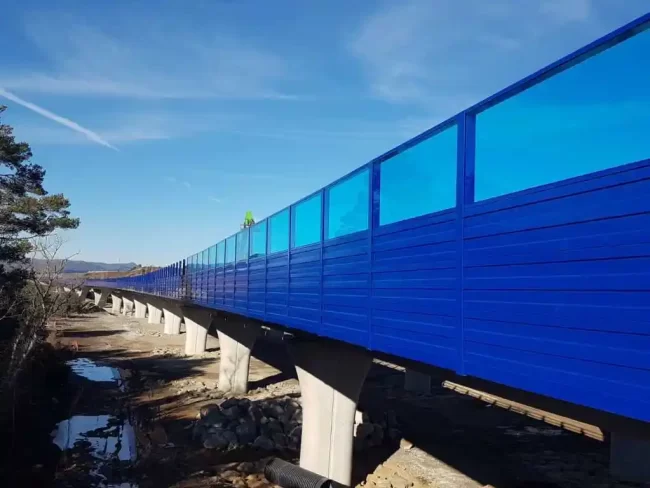What’s the Deal with Noise Barrier Sheets? A Closer Look at Their Role in Construction
If you’ve ever walked past a construction site, you’ve probably noticed the towering sheets surrounding the area. These aren’t just there to block your view—they serve an important purpose in managing noise pollution. Noise barrier sheets are widely used in construction to reduce the impact of loud machinery and activities on surrounding communities. But how effective are they really?
What Are Noise Barrier Sheets?
Noise barrier sheets are temporary or semi-permanent structures made from specialised materials designed to absorb or block sound. They are commonly seen on construction sites, where they help reduce noise levels for nearby residents and businesses.
Unlike permanent noise barriers made of concrete or metal, these sheets are flexible, lightweight, and easy to install.
A noise barrier sheet is typically made from materials like:
- PVC and Vinyl. Known for their sound-dampening properties and durability.
- Fibreglass and Foam Layers. Absorb sound waves and prevent them from spreading.
- Composite Fabrics. Designed for maximum noise reduction while being weather-resistant.
How Do Noise Barrier Sheets Work?
Noise travels in waves, and barrier sheets work by either blocking or absorbing these waves. Here’s how:
- Blocking Noise. Thicker, denser sheets create a physical barrier that prevents sound from passing through.
- Absorbing Noise. Some sheets are engineered with sound-absorbing materials that trap noise instead of reflecting it, reducing echo and overall sound transmission.
- Deflecting Sound Waves. When placed strategically, these sheets help redirect noise away from sensitive areas like schools, hospitals, and residential buildings.
Why Are Noise Barrier Sheets Important in Construction?
Construction sites are among the noisiest urban environments, with machinery, drilling, and hammering contributing to high noise levels. Without proper noise management, excessive sound pollution can lead to complaints, legal issues, and even health concerns.
Here’s why noise barrier sheets are essential:
- Protecting Public Health. Prolonged exposure to loud noise can lead to stress, sleep disturbances, and hearing problems.
- Reducing Noise Complaints. Construction companies face fewer complaints from residents when noise levels are controlled.
- Complying with Regulations. Many cities, including Singapore, have strict noise pollution laws that require construction sites to take noise reduction measures.
- Improving Worker Safety. Lowering noise levels can help construction workers communicate better and reduce the risk of accidents.

The Advantages of Noise Barrier Sheets
Noise barrier sheets have become a popular choice due to their practicality. Here are some of their key benefits:
- Easy Installation and Mobility. Unlike permanent barriers, these sheets can be set up quickly and moved as needed.
- Cost-Effective Solution. They offer a cheaper alternative to building rigid noise barriers while still providing significant noise reduction.
- Versatile and Customisable. Available in various sizes and materials to suit different site conditions.
- Weather-Resistant and Durable. Many sheets are designed to withstand harsh weather conditions, making them suitable for outdoor use.
The Limitations of Noise Barrier Sheets
While noise barrier sheets are effective, they do have some drawbacks:
- Not as Effective as Permanent Barriers. They may not provide the same level of noise reduction as solid walls or acoustic panels.
- Wear and Tear Over Time. Continuous exposure to weather and dust can reduce their effectiveness.
- Limited Coverage. To be fully effective, they need to be positioned correctly, and gaps between sheets can reduce their efficiency.
Are Noise Barrier Sheets the Ultimate Solution?
Noise barrier sheets play a role in minimising construction noise, but they work best when combined with other noise reduction strategies such as:
- Using Quieter Machinery. Modern equipment is often designed to operate at lower noise levels.
- Scheduling Work Smartly. Limiting loud activities to certain hours can help reduce disturbances.
- Permanent Noise Walls. For long-term construction projects, combining sheets with solid noise barriers can provide better results.
Conclusion
Noise barrier sheets are a practical and effective way to control construction noise, making urban development more bearable for nearby communities. While they aren’t a perfect solution, they serve as a crucial tool for minimising noise pollution in an inherently loud industry. If used correctly, they can help create a quieter, more liveable environment without bringing construction to a halt.
So, next time you pass by a construction site and see those noise barrier sheets, you’ll know exactly what they’re doing—and why they matter!


